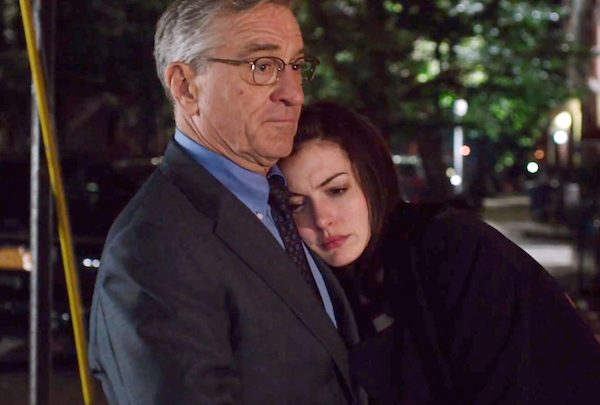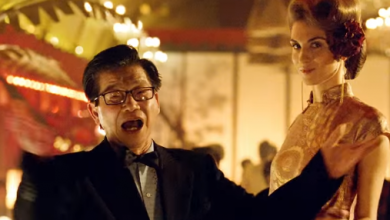The Intern – What Feminists and Minorities have in Common

This report is about the movie The Intern (not to be confused by The Internship) starring Robert DeNiro and Anne Hathaway. Here is the summary (from Wikipedia):
70-year-old widower Ben Whitaker (Robert De Niro), a retired executive at a phone directory company, applies to a senior citizen intern program after retirement has gotten too boring for him. The company he applies to is About the Fit, a fast-growing e-commerce fashion company, whose founder and CEO Jules Ostin (Anne Hathaway) had previously agreed to a community outreach program where seniors will intern at the firm. Ben impresses everyone and is one of four hired.
Key points here Ben (DeNiro) is far lower on the totem pole than Jules, who is the CEO of the company. Ben works as an intern for Jules. But as you’ll see, the movie shows Jules as weak and helpless and Ben as essentially flawless, a ladies man, and has a superior business mind to Jules. He overrules her routinely despite his position.
Jules (remember, she’s the CEO) breaks down crying FOUR TIMES in this movie, including one time at work (on news the board is considering another CEO).

The other primary female employee shown is Jules’ assistant who also breaks down crying in the office. Ben, the white male, “of course” is a rock. Routinely, Jules looks to Ben for advice on everything and looks for his approval on decisions such as who to select as a CEO. She needs him for emotional support about her relationship problems. Ben is happy to mansplain everything to Jules.
As her driver (remember, he’s an intern) he overrules her judgment on how to get to places. Sure enough he’s always right, choosing routes that get them where they’re going faster. Jules apologizes to Ben more than once for “being wrong”. DeNiro effectively becomes the decision-maker.
Further, Jules is patronized by other men in the office. And not in a knowing way that says “This is what women face”. It is done in a way that makes it seem like it is appropriate and natural. In one scene, a male employee (whose role is unclear, but he is not CEO like Jules) approaches Jules and tells her they need to talk. As they walk together, Jules is multi-tasking, listening while glancing at her phone. He grabs her phone away from her and keeps talking to her.
She does not protest; the scene is shown as justified (given her “conduct”). He is talking at her the whole time. He puts his arm around around her at one point, seemingly not having boundaries or the typical respect for someone who is the head of the company.
And of course the white male fantasy, devised by the writers and directors behind this movie, doesn’t stop there. DeNiro is aggresively pursued by multiple women- they compete for him. The woman his age aggressively pursues him despite his indifference, she plants a kiss on him out of nowhere. And tries to compel him to go with her on a date. He is amused by her interest but doesn’t reciprocate. This is an important element in the white patriarchy where women are shown throwing themselves at the man and trying to get him by any means.
Ben is the talk of the company. Despite his seemingly minor role visible to other employees, he is praised by everyone. They do this blatantly, saying how amazing he is. They give him totally uncritical adulation.This is the kind of “building up” Hollywood uses to imbue white men with unrivaled social status. Of course, this makes women strongly attracted to them (also see: Royal Pains) . When Ben gets approached by a younger female masseuse at his company, in their first interaction, she can’t help but rub his crotch suggestively, in front of others. He ends up sleeping with her later.
In a disturbing scene towards the end of the movie, Jules invites DeNiro (who is 40 years older than her) into her hotel room late at night. They have a drink. Jules tells him to rest on the bed; she says she’ll sit on the couch. But then, Jules then lays down on the bed next to Ben. They are both in robes. Nothing transpires between them or nothing is shown at least; but the sexual tension is clear. Just like “Whatever works” and pretty much all Woody Allen movies, the young beautiful woman cannot help but throw herself at the white male, even if geriatric.
None of this is depicted as amusing or odd. It is to say that white men are always desirable no matter their youth or old age, weight, height or any other factors. White women and minority women should always see them as suitors.
It doesn’t end here. Women are depicted in a very old-fashioned way including being poor drivers. When Ben isn’t available for driver duties, a woman takes his place. She promptly nearly gets into two major crashes. And there is referencing women as less than adults. DeNiro,talking about Jules to other men, says “What’s wrong with that girl“. She isn’t shown much respect at all by her own intern, who is the hero of this movie. At this point, it is important to mention the study we reference in Kulture’s About Page.
The academic journal Communication Research featured a study showing that exposure to TV lowered the self-esteem of minorities (and girls). But raised the self-esteem of white boys.
America’s entertainment media is primarily managed by white males; it represents their world view, their dreams, their self-importance. As you can see from this study, both women and minorities are shown as “lesser”. We both suffer in the real-world from this controlled social conditioning. White males are the only ones who emerge for the better from exposure to their TV and movies. Let’s keep that in mind and not get entangled in quarrels over feminism and ethnic minorities masculinist communities. We have unique problems but we face a very similar threat in our psychological well-being from the same source.
This whole website is about how Hollywood harms the image of Asians. But even in The Intern we see it – in very subtle ways. In a conversation between an Indian male and a white role-player, the white person is talking and the Indian male is listening. When the Indian male speaks, the white character turns away while the Indian male is speaking.
In one scene the Indian guy is asked whether one of Hathaway’s emails can be recovered. He says there’s no way. DeNiro quickly adds there is a way and goes about accomplishing it. White males know all and everyone else is just a helpless bystander.
Additionally, the exclusion of Asian men – a staple of Hollywood-continues in this film. This despite Hathaway’s company is a startup – which are heavily Indian and Chinese, and often making up 20%+ of a startup’s workforce. Well not in Hollywood’s dream world- it is white patriarchy at its finest.
White women, minority women and minority men all suffer from their control of the culture.
-
OFFENDER: Warner Bros.
CATEGORY OF OFFENSE: Self-Aggrandizement ( White Masculinity)
MEDIA TYPE: Movie
OFFENSE DATE: September 25, 2015
URL: Click For More





